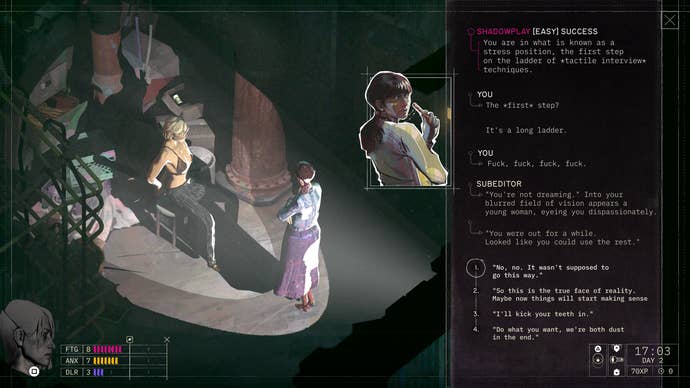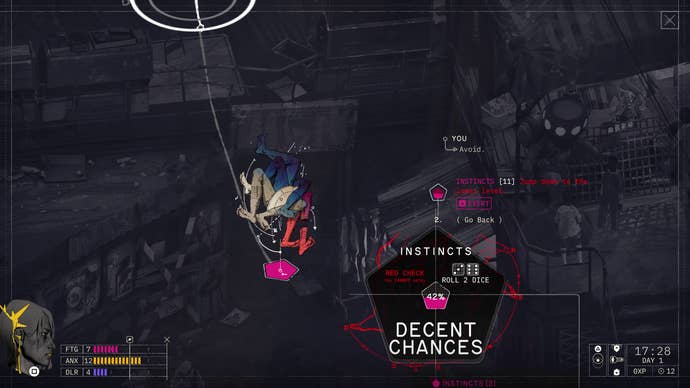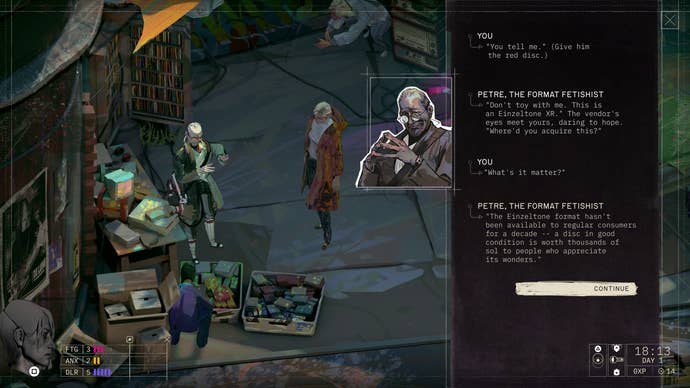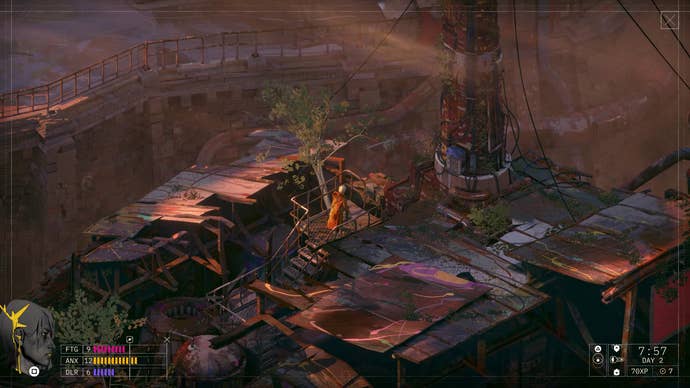Zero Parades is, if you ask its creators ZA/UM, a lot of things. It is an espionage CRPG. It is a character study of Hershel Wilk, the burnt-out, fallen-from-grace spook you’ll be playing as. It is, as I’m told before being shown some very early footage of the game in motion, “a story about failure, and about crippling regret.”
It’s also, quite nakedly, a Disco Elysium successor, perhaps the most overtly Disco-y in what’s set to become a bizarrely crowded field. Some will like that, I imagine. But it’s odd to see Zero Parades cling to the past, while so explicitly asking you to confront it.
Hershel starts the game as a “quasi-ex spy” for the communist Superbloc, one of three factions – along with an equal and opposite fascist superpower, and a shadowy international development bank – wrestling for influence across a fairly horrible-sounding globe. Caught in the middle is the sovereign, ostensibly democratic state of Portofiro, the site of a bungled op that sent Hershel to desk job purgatory, and where she’s now been ordered to return to investigate a new mystery.
On arrival, her most urgent concern – and by extension, a major focus of the game – is to reassemble her old crew, all of whom she’d left out to dry in her escape. Successful re-recruiting will thus require mending some shattered relationships, a process ZA/UM say may not be possible for everyone if they remain sufficiently ticked off. Or, indeed, if you fluff the reconciliation yourself.

Failure both is and isn’t a big deal in Zero Parades. It’s the background radiation of Hershel’s life: she failed before, and now she’s being given one last chance, she fears failing again. Portofiro, too, is a country with its best years behind it, many of its residents crammed into decaying slums that could pass for unexplored neighbourhoods of Martinaise. As a game state, however, failure will rarely mean the end, as it’s supposedly possible to irretrievably botch major objectives yet continue onwards regardless.
There was already an element of this in Disco’s skill check fails, which is something else Zero Parades continues with – I witnessed one scene where Hershel, in search of a disguise, approaches a table covered in hats and scarves before a bad dice roll has her don the oversized headpiece of a cartoon mascot costume. Tradecraft. But “failing forward,” as the developers put it, has been deemed viable enough that the story will bend and branch according to both your intentional choices and your miserable misfires.
So I’m told, anyway. The preview didn’t show much of this in practice beyond the hat thing. Though I did get a better look at Pressures, a trio of reverse-health bars that measure the stresses of being a lone agent who everyone hates. Gauges for Fatigue, Anxiety, and Delirium will fill up depending on your choices, with potentially fatal consequences if one of them hits the brim.

Although they can be reduced by, say, a good sleep, their interplay with skill checks means that some opportunities may be too good not to give Hershel nervous exhaustion. If a check looks too unlikely, you can elect to ‘exert’ yourself – like smashing a door lock instead of looking for another entrance – for a chunky boost to success probability. But! Exertion will also raise of one of your Pressures, leaving you to decide whether the improved chance is worth the physical and mental toll.
There’s also a dash of extra choiceyness in the Conditioning menu, which is described as “the Thought Cabinet Plus-Plus-Plus.” Here, as in the mind-sideboard of Harry Du Bois, you’ll gather thoughts and ruminate on them for skill point adjustments, except this time you can opt to ‘reinforce’ or ‘punish’ the thought instead of simply internalising it. Besides further cementing Hershel as an even more conflicted soul than Disco’s amnesiac detective, Conditioning seemingly provides another avenue for roleplaying, as reinforcing or punishing thoughts will always make different tweaks to different skills.
Speaking of which, whereas Harry’s skills were mainly about defining him as a cop, several of Hershel’s aren’t really related to her day job at all. That’s not to say they can’t be useful in checks, but they can also be invested in just to shape who she is as a person. Technoflex, for example, represents her inner hardware geek, flaring up when she handles cassettes or enjoys the heavy clicking of old machinery.

I, for one, would support Hershel packing it all in and opening up a radio repair shop where she can appreciate the contours of broken speaker cones in peace. Instead, she’ll also be thrust into what ZA/UM call Dramatic Encounters: faster paced, more obviously perilous pseudo-action sequences, befitting of an espionage thriller. CRPG purists will be glad to hear that these are, judging from the rough version of a Dramatic Encounter I saw in the preview, still navigated through text and dice roll decisions, though I was left wondering if they stayed a little too true to the formula. In the scene, Hershel is meant to be shaking a tail, but an apparent lack of time pressure (or any visible threat) let the tension evaporate in seconds.
Still, it was only a prototype build and Zero Parades doesn’t even have a release date, so you’d think there’d be time to inject Dramatic Encounters with a little extra drama. Besides, at least it’s an attempt at something new. This game’s skills, Conditioning, and even the idea of surviving cockups all expand on ZA/UM’s earlier work, but it isn’t always clear whether Zero Parades is inspired by Disco Elysium or beholden to it.

Aesthetically, it looks a lot like Disco Elysium. The way characters speak, including your own, sounds a lot like Disco Elysium. The manner in which you interact with the world and attempt to influence its people feels a lot like Disco Elysium. It even recycles the communism versus fascism conflict, while once again suggesting – through the sight of Portofiro’s ruin – that centrism might be worse than both.
Thinking “Hmm, it’s more Disco Elysium” in adverse terms feels strange in itself. There was a time, before ZA/UM’s internal ruptures, that half the PC owners on Earth would have bit some Estonian hands off for a Disco 2: Elysium Harder. But, realistically, this is a very different ZA/UM to the one that existed in 2019. It still has the right and the means to show us what it can do, but Zero Parades is taking a big risk by trading so much on past glories, with or without its own affordance for mistakes.







